Gambia Government Issues License To GACH Mining Company To Export Black Sand
The Fatu Network has been reliably informed that The Gambia Government has issued a mining license to Gambia Angola China (GACH) Mining Company to export the heavy mineral concentrated sand locally called “black sand” from the country.
The Managing Director of GACH Group, Alhagie Sillah has confirmed that the acquisition of a mining license for black sand at Sanyang, Kartong and Batokunku respectively, saying that the company is 100% Gambian owned.
Sillah who was a former Banjul parliamentarian told The Fatu Network that the GACH Group is owned by a Gambian businessman, Abubakary Jawara who is serving as the country’s Consular General to the Republic of China since 2006.
“We have followed the due process to acquire the mining license from the Geology Department in 2017,” MD Sillah said.
“We went through all the procedures at the Ministries of Justice, Finance, Petroleum, Geology Department and Private Public Partnership,” he added.
The GACH Managing Director told The Fatu Network that the company is the first ever Gambian mineral mining company since 1926. He spoke about the Group’s target to create 2, 000 jobs, build local capacity, technology transfer and value addition amongst others within two years.
MD Sillah explained that the Company was the highest bidder to sell the stockpiles of mineral sand confiscated by the state at the seaport.
“We offered $200 US Dollars per Metric Tonne, out of which 60% goes to the state after all the expenditures,” he said.
When asked about the equipment belonging to other companies left at the mining site, he said they would not touch them but will bring their own equipment.
“We are bringing digital dredging machines worth of $1. 5 Million US Dollars”
It could be recalled that mining activities at Sanyang and Batokunku were major concern to many Gambians during the dictatorial regime of the former President Jammeh who connived with foreign counterparts to exploit the country’s resources with impunity.
President Barrow during his recent interviewed with The Fatu Network, has confirmed the signing of contract with a Gambian mining company but did not disclosed the Company’s name, saying he has forgotten it.
The Director of Geology Department, Mr Abdoulie M Cham has confirmed the granting of license to GACH Mining Company.
Meanwhile, the Gambian mineral mining company is working with Chinese business partners to export the black sand to China.
Immigration Department Detains Pedophile Pardoned By President Barrow
Security sources say The Norwegian Paedophile, Mr. Svein Age Sandaker who was pardoned last week by President Adama Barrow among other prisoners is currently detained by the Gambia immigration department at its training school in Tanji.
‘The immigration department has done what is required of them by detaining a man who should not have been pardoned’ A soure told The Fatu Network
As we file this report, Mr. Sandaker is still detained at the immigration training school and Plans are in high gear to move him back to mile 2 hopefully this evening.
We will keep you posted!
Car Explodes At Westfield
A massive car explosion has Monday afternoon occurred at Westfield by former co-operative a few hours ago.
Fortunately no one was injured
The Driver Landing Jammeh said he has no idea what caused the explosion.
‘ All I saw was smoke igniting from the car, then I immediately rushed out of the car and called the fire services’
Justice Minister Says He Did Not Recommend The Release Of Mr. Svein Åge Sandåker
I am learning with utter dismay reports circulating on social media that I recommended to the President for the exercise of his prerogative of mercy on one Norwegian citizen convicted of child abuse in The Gambia.
I want to make clear that I was not aware of this matter neither did I make any such recommendation to the President. In fact, I am currently out of the country on the hajj in Saudi Arabia. This matter was not brought to my attention for advice and I have consistently taken a hard line position on homicide and sexual offences convicts as reflected in all previous pardons in which I have participated as a member of the Prerogative of Mercy Committee which also includes the Honourable Minister of Interior, the Inspector General of Police and a religious leader.
I therefore reiterate that I was not involved in any decision to recommend for pardon the said Norwegian citizen contrary to reports that I made the recommendation. Upon my return from the hajj, I will get to the bottom of this matter and find out how the MOJ came to be associated with the purported conflicting statements released on our twitter page.
Meanwhile, it is also disheartening to note that some people see this incident as an opportunity to attempt to further tarnish my reputation by associating this incident with a previous one involving my brother last year. I want to state that I am not my brother and I am not responsible for my brother’s actions as a private legal practitioner. I would like to be judged on my actions alone regarding my professional conduct and not constantly get associated with the actions of my brother who is a private legal practitioner.
I will not allow anyone with any kind of agenda whatsoever to distract me from my objective of establishing strong foundations for democratic practice, respect for human rights and upholding the rule of law in our country. The challenge is hard enough without the pettiness and personal attacks from some quarters albeit limited.
Aboubacar Ba Tambadou
Pedophiles Should not be Rewarded with Peace and Freedom:
Alagi Yorro Jallow
Gambians are very good at debating morality and very bad at reaching any conclusions about it. In an ethically relative society like ours, all manner of moral felons — corporate criminals, drug peddlers, even killers — have at least some constituency that’s willing to hear them out and show them mercy. Not so to a notorious pedophile like Norwegian, Svein Åge Sandåker, a convicted pedophile granted presidential pardon during the holy feast of Eid ul-Adha.
Nearly everywhere, pedophilia earns its perpetrators the full villagers-with-torches treatment. We don’t want them in our communities, we don’t want them in our society. Even in prison they’re outcasts, becoming the moral underclass of the moral underclass — the untouchables’ untouchables — chased into the rabbit hole of protective isolation and mauled to death if they emerge. And be honest: Do they deserve any better? Maybe not. But maybe society as a whole does. The Gambia teetered between sorrow and rage few days ago after a Norwegian, Svein Åge Sandåker pedophile, committed his incomprehensible sexual act on 6 teenagers was granted presidential pardon according to the Ministry of Justice.
It’s an egregious error for a leader to show such a judgment and ignorance. “The prerogative of mercy, and some convicts will deserve it nonetheless, Mr. Sandaker is undeserving of any mercy, from man or God”. The president shall rescind the conditional pardon of Svein Åge Sandåker. Pedophiles should not be rewarded with peace and freedom.
‘Name and shame” are the imperative of exposing persons deserving of blame owing to their actions. And inactions. Such persons are perceived (dishonest and corrupt) to be culpable because of their effulgence to mega- sleaze, over-indulgence. And, negligence. Yet here, the named will be unashamed. They’ll deny, lie, and deny culpability (‘pardoning a notorious pedophile”), seek immoral and sordid behavior. Where, why! do we get it so wrong? Their exposition? When our leaders have become misleaders and mentors have become tormentors. When freedom of expression becomes the target of oppression; opposition becomes our position
There is something in that criminal justice system that pointed to all our failings: the ambition, the frenetic sordid behavior; the greed. The culture of corruption has led to mediocrity everywhere…” normalizing pedophiles” Norwegian, Svein Åge Sandåker, is a convicted paedophile. He was found guilty of “abusing about 6 children, the youngest victim was about 3 years at the time. Reports have it that Sandaker was previously convicted in Norway twice for sexually abusing minors and had an incestuous relationship with his own son for which he was convicted in 2006”. Granted Presidential pardons go not to the most deserving but to the best connected.
The Palaver on Adama’s Second Term Bid:
Alagi Yorro Jallow
After many months of waiting for the other shoe to drop, Gambians finally heard President Barrow announce his readiness to fight for re-election. Silent majority of Gambians would have been relieved had he chosen to forego a second term; but many others were probably ecstatic about his declaration. There is nothing unusual about what he has done. It was long expected that he would find the allure of power quite irresistible, and the giddy delight of his supporters too entrancing, for him to be indifferent to a second term.
Has the coalition executive committee members given the honor of being the first to hear from him directly; but even if they were not so honored, some coalition partners have always been with him lock, stock, and barrel, and would have swallowed every form of indignity hurled at them given their naturally ingratiating disposition.
When he made the terse unofficial public announcement at political rallies, and on media interviews that his mission, vision, action plan for the Gambia cannot be realized in a short span of time (three years of the coalition, Memorandum of Understandings agreement (MoU), transition period) and afterwards Adama Barrow changed his mind that the 1997 constitution legally mandated him for five years- term. Barrow eloquently argued that the constitution, the supreme law of the land supersedes any coalition MOU agreement. There was a time when men were men. Their word was their honor and honor were “the” bond. I am sure apes won’t do what the man does today.
What is the furor about the change of mind by Adama? So, he changed his mind and broke his promise of honoring the bond of the MoU. If a candidate promises to do a term and then changes his mind, no laws have been broken; no legal infractions. Moral issues? Perhaps. But elections according to our Constitution and the electoral commission are guided by laws and not moral issues. When promises are broken, or people are misled, the bonds of trust are breached. “If a man makes a vow to the Lord or swears an oath to obligate himself by pledge, he must not break his words must do everything he has promised”.
However, coalition 2016 of opposition political parties that ended 22 years of entrenched dictatorship was a coalition of strange bedfellows and a one-chance special purpose vehicle to get rid of President Yahya Jammeh by all and any means possible.
Unfortunately, President Barrow has also been behaving as if he does not know or he does not care about the utter cluelessness of his team. We suspect he knows, but his arrogance is perhaps his hubris. He doesn’t care because he does not think that Gambians are important enough. He projects a vision, an image, and optics of power in contradistinction to the objectives of democratic governance.
Adama Barrow significantly rested his decision on the “clamor by Gambians”. That clamor was of course neither unanimous nor overwhelming, and it seemed even evenly divided between his supporters and opponents, but it was, to him, nonetheless a clamor still, and one worth honoring and not honoring the MoU, the coalition agreement to voted him into office.
And so, whether anchored on people’s clamor or rested on something more inspiring and noble, the president’s second term ambition has finally been kick-started. Given how easily his supporters are frenzied by his ambition and person, what perhaps really matters is that he has finally announced the momentous decision. Reports suggest that he received a standing ovation when he disclosed his intention to his close allies and many other politicians instantly jumped on the bandwagon. The ululation will doubtless continue, converts to his second term ambition will swell, and countless Gambians will fawn over him in record number in a manner close to a mafficking.
In 2016, the coalition had campaigned on these main promises, to wit, anti-corruption, security, institutional reforms, human rights, justice, repatriation, the economy and heal and reconcile a divided nation. His approach to the anti-corruption war has been desultory and generally ineffective. Like caviar to the general, it has tackled symptoms with elegant flourish more than initiate policy reforms and political and economic restructuring necessary to deoxygenate the cancer afflicting the body politic or create an institutional atmosphere that is durable, civilized and progressive.
Adama Barrow’s government has paid some attention to the economy, but he has never personally seemed capable of understanding its dynamics, let alone its modern manifestations. Though he continues to sell the narrative of an economy bankrupted by his predecessor, he has not fully and convincingly persuaded the public that the tailspin to which the economy was driven shortly after his assumption of office was not due in large part to his government’s naivety in economic issues. That economy, even after its emergence from recession, has not quite received the structured and nuanced shot in the arm needed to infuse it with the growth that takes a huge percentage of the people out of poverty. He will be required to propound and defend new concepts of the economy, beyond increased rice output. And, despite his inexperience-induced lethargy, he will also be required to vigorously champion new ways of doing things. Whether he will be able to convince the electorate that he is that man for 2021 remains to be seen.
President Barrow’s biggest protection lies in the legacy that he leaves behind. The people he listens to, those who claim to be his managers or handlers, those who speak for or claim to speak for him, have done incalculable damage to the minimum legacy that he can lay claim to – being the third President of the Gambia if he insists up to 2021 and his legacy not reconstructed he may have the big challenge of legitimacy to deal with if he gets another mandate.
The SSHFC Saga: How It All Started, Writer Explains
Dear Editor,
I have a very reliable information on the SSHFC Vs Modou Camara. The board of director under the new chairman Papa Sering Jallow, unanimously took a decision to dismiss Modou Camara. The minister of finance Mambury advice for this to be changed to termination so that at least Modou Camara will have his benefits paid to him.
The letter was written and about to be issued when Modou Camara visited the statehouse and the Secretary General Habib Drammeh involved the president. The president was misinformed by SG on how the Board came to the decision, the president was further given advice to constitute an independent committee to look into the same issue, which was an illegal act. Letters were exchange between the board and the finance ministry about the illegality of setting up an independent committee.
This past Thursday the Chairman Of the board Papa sering Jallow held a meeting with the president in the presence of the secretary of cabinet Mr Ceesay. The President listened to the Chairman and the president was convinced to at least suspend Modou Camara for 3 months.
The chairman ordered for Camara’s suspension by issuing a letter to him which your network had rightly reported.
Due to weak security from the contracted company, the SSHFC Management were surprise to see Modou Camara reporting to work. The management via the human resource took the decision to disable the personal access control of Modou Camara to stop him from accessing work network and access to clock into the building.
The security company has been reminded of their contractual obligation to secure the building and comply with decision from management.
You may ask why does Modou Camara has the audacity to behave the way he does. It’s all due to the SG Habib Drammeh has a personal agenda against The MD Mr Manjang.
MD Manjang is the chairman Board of directors at the Former GPTC, the Transport company. Habib was the adviser to the company until dictator Jammeh arrested the petroleum employees and the members of the board of directors. These include Edi Jobe Serra walley Ndow and Mr Kanyi who was then the MD of The bus company but also a board member at the petroleum company.
This was the time Habib was made the MD of the bus company. By then Mr Kanyi was unjustly detained at the Mile prisons and PMO terminated his services. Both acts, the detention and the termination were illegal. PMO didn’t have the power to terminate or dismiss members of the cooperation. These powers are vested on the board.
When the new government came to place the Kanyi case was reviewed and found to be a wrongful dismissal the board took a decision to reinstate Mr Kanyi and relocate Habib Drammeh back to the role of an adviser until is contract expired within the year. Habib wasn’t happy with the decision, he went on lobbing until he was appointed Minister of interior. Then Mr Kanyi assumed the MD position. Habib refused to hand over to the MD.
An audit review was done on the cooperation and the report found the company was left in a very bad state. Habib was implicated in financial and management malpractice a report of which was forwarded to the President by the company’s board of directors.
Since Habib came in as a SG he made it his agenda to destroy Mr Manjang due to the above revelations. By then MD of SSHFC had a very good working relationship with Modou Camara. Modou had written numerous emails praising MD Manjang. When Mr Manjang introduced the austerity measures at the company, the SG saw an opportunity to use some of the senior staff to creat problems and with his backing to get Mr Manjang out of the company.
I can also reliably inform you that the SG is stopping the Police from removing Modou Camara from the building the SG is pushing for a stand off.
The Fatu Network Contacted The Board And MD Manjang
Meanwhile, when contacted by The Fatu Network to shed light on the issue, the board chairman, Mr. Papa Seringe Jallow said the issue is right now at board level and that they will be happy to share with the media once the findings are complete.
For his part, MD Manjang said ‘ Fatu, The Chair feels this is not the right time to discuss the issue in public, he feels its best to deal with it internally for now’.
SG Habib Drammeh could not be reached on his phone for his side of the story. We will keep you posted!
Conflicts of interests may worsen in The Gambia’s TRRC: Is anyone listening
Dr. Omar Janneh
The Gambia’s TRRC seems to be turning into a conflicted Commission because the Executive seems totally determined to continue to display total disregard to even the problematic TRRC Act, 2017 they constructed. We are gradually witnessing the composition of a TRRC that may earn it the most conflicted truth commission. Some of the readers may be aware of the following pieces:
- On the Appointment of the Executive Secretary, Deputy Executive Secretary and Possibly Other Staff to the TRRC
- Conflict of Interest in The Gambia’s TRRC: Is Anyone Listening?
- Any Commission that Fails to Take Conflict of Interest and Impartiality Seriously is Likely to Fail
- On the appointment of Alagie Barrow: A Note to Baba Galleh Jallow
Here is how the journey of the (seemingly conflicted) TRRC started:
- The problematic TRRC Act, 2017 which gave excessive powersto the President was passed on December 13, 2017 and gained presidential assent on January 18, 2018;
- Acting within the TRRC Act, 2017; 22(2), the (seemingly conflicted) President, in consultation with the Minister and Public Service Commission, appointed the Executive Secretaryof the TRRC who they should have known is conflicted and the Executive Secretary himself should have known that he is conflicted (TRRC Act, 2017; 17(1-4);
- Acting within the TRRC Act, 2017; 24(1-3), the (conflicted) Executive Secretary appointed the Director of Research and Investigationswho we know took up armsagainst an elected government in The Gambia which makes him conflicted (TRRC Act, 2017; 17(1-4);
- Acting within the TRRC Act, 2017; 24(1-3), the (conflicted) Executive Secretary appointed the Deputy Executive Secretaryand Director of Communications, Outreach and Mediaof the TRRC.
Going forward, it may be helpful for the Secretariat to find creative ways to quickly establish a website dedicated to the TRRC, which may send a positive signal to the donors in regards to our priories and image. It will allow the rest of the world, especially those who are not Facebook and Twitter users, to know what is going on with The Gambia’s TRRC as well as lessen the personalisation of the TRRC and its consequent deepening of the conflict of interest that has already surrounded the Commission.
There is an expectation (at least from fair-minded citizens, bilateral partners, AU, UN, and donors), because it is at least implied, if not very explicit in the TRRC Act, 2017 that the post of Chairperson, Deputy Chairperson (-indeed all Commissioners) of the Commission must go to individuals with no discernible conflicts of interests [TRRC Act, 2017; section 17(1-4)] as well as those who fulfil the criteria in section 5(3) of the TRRC Act, 2017. At the very least, the criteria the Commissioners and members of the TRRC must fulfil (and it is against these measures, i.e., the Executive’s own rules that much is being written about) are essentially the 2 sections of the TRRC Act, 2017 which are as follows:
- TRRC Act, 2017; section 5. Appointment of members
(3) A person shall not be qualified for appointment as a Commissioner if he or she –
- is known to be actively involved in a political party;
- an un-discharged bankrupt, or;
- has been convicted of a felony.
- TRRC Act, 2017; section 17.Disclosure of interest
- A member of the Commission who has an interest in any complaint made to the Commission, shall-
- disclose to the Commission the fact of such interest and the nature of it; and
- not take part in any hearing or decision of the Commission relating to the Complaint.
- For the purpose of this section, “interest” means any matter that has potential to undermine or compromise the independence of or judgement of a Commissioner.
- A disclosure of interest by a member shall be recorded in the minutes of the Commission.
- A member who contravenes sub-section (1) may be removed from the Commission.
On August 20/21, 2018, we received theannouncementof the 11 names intended to be appointed by the President as Commissioners of the TRRC. Please find below the names of the 11 Commissioners the President intends to appoint:
- Abdoulie (Mori Kebba) Janneh: Chairperson – Former Under Secretary General of the United Nations at the Economic Commission for Africa and current Head of the Mo Ibrahim Foundation (MIF).
- Adelaide Sosseh Gaye: Deputy Chairperson – Former Principal Saint Joseph’s High School, Gender Consultant and Retired Educationist.
- Anna Ngalu Jones- member – National Coordinator, West African Network for Peace-building, The Gambia (WANEP). Peace and conflict resolution expert.
- Mustapha Kah: Member of the National Youth Council. A graduate in Political Science and Law and currently working at the Ministry of Basic & Secondary Education (MOBSE).
- Abdourahman Sey: Member representing the Central River Region. He is an Imam
- Ma Nyima Bojang: Member representing the West Coast Region. She is a teacher.
- Amie Samba: Member representing Lower River Region. She is a retired civil servant
- Lang Kinteh: Member North Bank Region. Retired civil servant.
- Jammeh Ceesay: Member representing Upper River Region. He is a farmer and the Agric Sub Head of the Village Development Committee (VDC).
- Bishop James Yaw Allen Odico: Member – Bishop of the Anglican Diocese of The Gambia.
- Imam Ousainou Jallow: Member – Imam, Pipeline Mosque.
It was very refreshing for the Executive to invite the public (the Gambians– in the country and abroad) to submit objections to the names. But this welcome announcement has been dampened by the fact that they only gave us 10 days to send the objections by no other means, but surface mail or on foot to the Justice Ministry, Marina Parade, Banjul. In fact, given this very tight deadline, one would have thought that the Executive would have facilitated the process for the public to submit their objections. The fact that there has been no or little known public sensitisation, and advocacy on the matter and no alternative methods were issued to enable citizens in the rural Gambia and the diaspora to send in their objections to the Commissioners intended to be appointed by the President seems irresponsible. Besides, they have not told us what they intend to do with the objections they receive and how many (valid) objections it would take to trigger a rethink of any appointment. Indeed, it is not known how many of us have seen, read and understood the TRRC Act, 2017 to allow us to object to any of the nominated Commissioners, should we need to. To ensure that we all have access to the (problematic) TRRC Act, 2017, please click here.
Now, a bit of search on the intended Chairperson of the TRRC, Mr. Abdoulie Janneh, revealed some of what the Executive shared with us about him. In regards to his current assignment, here is what can be found on the Mo Ibrahim Foundation’s website, and you can click hereor read the text below:
“Abdoulie Janneh is Executive Director, Liaison with Governments and Institutions in Africa for the Mo Ibrahim Foundation; the former UN Under-Secretary-General and Executive Secretary of the Economic Commission for Africa (ECA), prior to which he was UNDP Regional Director for Africa. Mr Janneh is a strong advocate for aligning development efforts to Africa’s priorities.
Mr Janneh remains engaged in supporting the African Union vision, NEPAD, the African Peer Review Mechanism and the climate change agenda.
He is chair of the African Governance Institute and serves on the Boards the Coalition for Dialogue on Africa (CoDA), Pax Africana and Africa Forum amongst others.”
Further searches show that Mr. Janneh seems to be a very,very busy man, but I am sure he has given this challenging assignment much thought. I think that Mr. Janneh’s wisdom, leadership, extensive experience in the MIF, and previous track record in UN and especially his contacts within it and elsewhere would be invaluable to the TRRC.
In regards to Ms. Adelaide Sosseh Gaye, Mr. Janneh’s intended Deputy, many would know that she has been a vocal critic of Dictator Jammeh. Similarly, her daughter, Ms. Ndey Tapha Sosseh has been a solid critic of Jammeh’s cruelgovernment, especially after the brutal killing- on December 16, 2004 of her dear colleague, our veteran journalist Mr. Deyda Hydara, of blessed memory. Furthermore, some of us would know that until recently, Ms. Ndey Tapa Sosseh was living in exilesince about 2009. We may also be able to say with some certainty that Ms. Adelaide Sosseh Gaye is a UDP supporter. If this can be confirmed, it makes her unsuitable for appointment as a Commissioner of the TRRC under the TRRC Act, 2017; 5(3)(a). Notwithstanding, Ms. Adelaide Sosseh Gaye seems sufficiently conflicted and therefore unsuitable for appointment, especially as Deputy Chairperson of the TRRC.
With 6 days remaining, the search intensifies (for me at least) on the remaining 9 intended Commissioners. Using the Executive’s own rules as outlined in the above sections of the TRRC Act, 2017, it remains unclear if all of the intended Commissioners can safely sail through without objections to their appointment as Commissioners of The Gambia’s TRRC. Overall, 10 days seems too short for the public, especially for most the affected victims in the country and abroad to send in their objections, by surface mail or on foot, in a timely manner. What may be certain at this stage, which may be the Executive’s design, is that the Executive’s actions may give them the outcome they want, but it may be an outcome that is prejudiced. Therefore, their actions further raise doubts about the TRRC as regards to its impartiality, fairness, legitimacy, credibility and above all its desire to deliver reconciliation and justice for some of those most affected by Jammeh’s brutal regime. In brief, any commission that fails to take conflict of interest seriously, with the Executive displaying tendencies for partiality, flawed or incompetent practices that commission is likely to fail.
‘UDP Is A Gambian Party Built By Gambians’ Lawyer Ousainou Darboe
By Omar Wally
Ousainou Darboe, Secretary General of The United Democratic Party, has said that The United Democratic Pary (UDP) is a Gambian party built by Gambians. Darboe made the remarks Thursday, August 23 during an exclusive interview with The Fatu Network in observance of the party’s 22 years anniversary.
UDP was registered as a political party on August 23, 1996.
‘Even myself (Ousainou Darboe) if I decide to betray The UDP, even an albumen (egg white) will be more valuable than me in this country’
‘UDP is a Gambian party, that is why the party survived up to this time’ Darboe said.
Darboe added that ‘Eleven of our party executive were arrested and locked up, if that had happened to any party that will be the end of that party.
He called on Gambians to be united and to move the country forward.
SSHFC: Barrow urged to intervene urgently as stand-off continues
The dust is yet to settled at the Social Security and Housing Finance Corporation as the standoff between the staff and Managing Director Muhammed Manjang seems far from over.
The Social Security board is said to have handed a three months suspension on a senior manager Modou Camara, the staffs’ representative at the Social Security Board level.
For six weeks now, staff of the Social Security have been at loggerheads with their boss, demanding for the removal of MD Manjang, who they alleged of corruption and neopotism.
Staff claim that Manjang is not leading the institution in the right direction after he approved a study package for a junior staff to study in Ghana costing the institution millions, a course they said is offered in the country.
in several media interviews, Muhammed Manjang described the allegations as unfounded.
Modou Camara has been the face of the staff in this saga. He led the recent sit down strike and the protest march to the presidency. He has been handed a three month suspension with salary by the board of social security.
Despite his suspension, Camara on Thursday reported to work even though he has been removed from the biometric system, therefore making it impossible for him to clock in and out.
United against Manjang, the staff say the suspension of Modou Camara as their representative at the Board level is unjusitifiable and demands the board to rescind the decision. According to them, the issue is not only about Camara but the entire staff.
The government says it has instituted an independent committee to look into the impasse at the social security with a view to resolve the matter as soon as possible.
In his recently held bi-annual meet the media, President Barrow says the committee was set up after there was a complain that part of the board were bias. The Secretary General Habib Drammeh, according to Barrow, was working to resolve the issue.
However, staff of the social security are not happy with the pace at which the government is reacting to the impasse. They urged the President to act immediately as they want justice.
MD Manjang could not be available for comment as he was said to be on a casual leave.
GAF APPOINTS NEW SPOKESPERSON
The Gambia Armed Forces has appointed Lieutenant Colonel Omar B Bojang as its Public Relations Officer. It could be recalled that Lieutenant Colonel OB Bojang has served in this appointment previously. He was first appointed as PRO to the Gambia Armed Forces in August 2008 to December 2012 and later from March 2017 to July 2017 where he was nominated to undergo his Senior Staff Course in Nigeria. Upon his returned he is again appointed as PRO.
Lieutenant Colonel Omar B Bojang was enlisted into the Gambia Armed Forces on the 4 February 2001 and commissioned into the officers’ corps on 3 July 2006. He has done series of courses both home and abroad and he has held various staff and command appointments in the Gambia Armed Forces commensurate to his rank. In a statement to the press he thanked Allah for all the blessings He has bestowed on him as an individual and the Gambia Armed Forces in general and the country as a whole. He also thanked the Chief of Defence Staff, Gambia Armed Forces Lieutenant General Masanneh Kinteh and the entire leadership of the armed forces for the trust and confidence reposed on him. He also thanked the press for their support to the GAF over the years. He urged the press to continue to support the GAF. He also called on the press to clarify anything through his office before reporting anything about the Gambia Armed Forces. He assured the press and the general public GAF’s unflinching support to development of The Gambia at all times. He furthered informs the press that GAF’s in its bid to make it more accessible and relevant in the 21 century has created a website where most of her activities will be featured. The website can be access on www.gaf.gm
Meanwhile the acting PRO Lieutenant Malick Sanyang has been appointed as the Deputy Public Relations Officer for the Gambia Armed Forces.
The Barrow Led Administration Should Desist From Religious Matters
A President who is democratically elected to serve all Gambians shouldn’t use his good office and/or influence to promote any religion in the midst of others particularly in The Gambia – a community of different religious beliefs.
The President should know that he is no more a private citizen, which is why he should be extra careful in handling religious matters.
The building of the said 60 mosques he talked about during his meet-the-farmers tour and the donation of 11 million dalasis to the Pilgrims in Mecca didn’t only indicate his misplaced priorities but a bias approach in treating the citizenry, whom through their taxes, fund his various travels and external relations of which the said donation is generated from.
The Barrow led administration has pressing issues to solve in making The Gambia the last place of hope on earth.
Furtheremore, the government should be knowledgeable of the fact that we didn’t elect a religious leader nor a mosque, church or shrine builder but a leader who will unify us and together push the national development agenda through socioeconomic and political advancement. Quite a few people of conscience both Muslims and non-Muslims alike disapproved his approach and as well demonstrated it on their various platforms of communication with some citing it as religious chauvinism with the divide and rule tactics slowly taking precedent in a country known to be one of the most tolerant nations on the globe.
Many Gambians, irrespective of their religious affiliation, have shown their distaste from the start without any visible sign of its ending despite the increasing cries against it.
However, we applauded the Barrow administration when they revoked the illegal declaration of The Gambia as an Islamic State by the former President, Jammeh but much effort is needed to ensure the existence of fair play as enshrined in our 1997 constitution .
Moreover, the national budget and any other source of public fund mobilized through the influence of the state shouldn’t be used for political patronage especially at the detriment of our dying agricultural, health and educational sectors.
We should understand that public servant and the President in particular should be accountable for any fund gathered by their offices by virtue of their positions as public servants if truly we’re serious about good governance and the democratization process of the so-called New Gambia.
In my humble opinion, I suggest that religious and faith matters should be left in the hands of religious leaders, who to my view have done tremendously “well” in leading their people over the years. The government only owe them the responsibility of providing a conducive environment for them to function in a way that does not violate or threaten the rights of others. This I believe is imperative in consolidating our co-existence which can be a unique model worthy of global emulation.
The Gambia belongs to The Gambians both those home and abroad, irrespective of our socio-linguistic or religious extraction and can only be developed through putting first things first and dedication to national duty and dialogue on things that matters.
Name John Mendy
Bsc (distinction) Political Science
Studying: Masters International Relations and Diplomacy
President of GAM FEDD
Secretary General: Banjul Open Debate
Don’t Romanticize Ignorance:
“President George Weah went back to school.
George Weah went back to books,
George Weah went back to learning”.
Alagi Yorro Jallow
“Ignorance is not bliss. Ignorance is tragedy. Ignorance is devastation. Ignorance creates lack. Ignorance creates disease. Ignorance will shorten your life. Ignorance will empty your life and leave you with the husks, nothing to account for.”
— Jim Rohn
My favorite author when discussing the hopelessness of the Gambia is the Ghanaian writer, Ayi Kwei Armah. He warns the black man’s “spring water” against flowing desert wards. The consequence of doing so, he says, is extinction. In the Gambia, we run a system that kills academic excellence; a system that proudly reserves front row seats for failure. It is a system that ignores what you know and rewards where you come from. The Gambia cannot piss on intellectualism and romanticize ignorance. We cannot now be allowed to start beautification, and theorizing ignorance over intellectualism and knowledge, this can’t be a viable condition of our people.
Fear and ignorance should be the end of so many in this country. Does one laugh or spit in disgust at this stupidity, now a daily occurrence. Or find that difficult undeserved place of compassion. That ignorance virus is potent. Some have openly invoked them as their inspiration when they get this rabid. A re-infection of sorts, reawakening a dormant prejudice that had been tamed over the years by the more-perfect union of Gambians that defeated darkness. Now this virus is eating up a storm in their minds all over again, acting irrationally in public and against their own best interests. It’s like watching a flesh-eating bacterium up-close consuming its victims one at a time daily.
Professor Niyi Osundare and another scholar A. Pius at Carleton university once published two sarcastic essays on the uses of ignorance and intellectualism. It may be time for both scholars to dust up their essays again for folks in the Gambia arguing and romanticizing of ignorance as the most strategic pathway to politics and disconnect intellectualism as an alienated beast that has and should have nothing to do with the life of the people-especially in the grassroots and in our villages.
We cannot have a long disquisition or discourse on this dangerous argument of those romanticizing ignorance and questioning the place or role of learning in the body politic and the politics. We should not have to make the obvious case that such arguments – which we hear daily these days – are a double tragedy because they come from the presupposition that our people are not producers of knowledge and intellectuals.
The poet disparaged the political leaders of the Gambia, whom, he said, had messed up the country. “The Gambia that created the Professor Lamin Sanneh, Dr. Jeggan Senghor, Dr. Karamo Sonko, Dr. Fatima Sigga Jagne, Dr. Lenrie Peters, Ebou Dibba and the Dr. Tijan Sallah’s have been “dishonored”. Look at what they have produced! Even with their electric literature, look at what they are producing! It is not a generational problem it is a political problem.
“It is not that Gambian scholars and writers are not distinguished; they are underdeveloped. This country is dying. Patients are dying in the hospitals. Schools are teaching children to be redundant. Ignorance is a curable disease; it must be cured. You can’t be a good leader if you don’t read. Illiteracy is killing the Gambia,” he lamented.
The argument in support of ignorance is simple. It erroneously divorces practice from knowledge. Such narratives conclude President George Weah then dragooned into the argument as the icing on the cake.
The only thing those to add are some significant details with those playing make-up artists for ignorance conveniently leave out in the narrative of George Weah. When he first ran for office, he was a near illiterate and could barely string two coherent sentences together. He was not well read. He was derided as ignorant.
“George Weah went back to school.
George Weah went back to books.
George Weah went back to learning”.
He enrolled for degrees and began to voraciously broaden his knowledge base. He hired personal professors who began to instruct him on wide ranging issues in the global knowledge economy. He read voraciously across various fields and disciplines in the social sciences and humanities. One Liberian Professor recently revealed that he was drawing up a monthly reading list for Mr. Weah at some point.
When President George Weah was at the Elysee on his first official trip to France. Go and watch his speeches – especially his unwritten speeches. Evidence of reading. Evidence of learning. Do not allow our emergency romanticizers of ignorance to persuade you that ignorance is what led Weah to the presidency because, in their logic, had he invested in intellectualism, he would have been alienated and disconnected from the people and would have become incompetent in grassroots strategy by “blowing too much grammar”.
Knowledge and politics, grassroots politics, are not mutually exclusive. That they became mutually exclusive in the Gambia is a function of four decades of systemic impoverishment of our people, turning them to the primal instinct of food. Those responsible for this situation cannot turn around and start hawking ignorance as the open sesame to the future of the Gambia.
Through their clever but mischievous separation of knowledge and practice, they romanticize lack of illumination and poverty as the singular condition upon which our people can and should be engaged – the people don’t understand grammar! This is the poverty they induced! Poverty is not romantic. I repeat: poverty is not romantic!
Evidenced has discovered there have been nine United States presidents without college degrees, who never attended college or completed a degree. So how did they make it to the White House? Two things—literacy, knowledge, intellectualism and a healthy dose of curiosity.
Each one of these presidents knew their education had been limited—some of them with as little of one year of formal schooling! Each of them made the decision to own their education and take it beyond the classroom. They filled their libraries with great books. When they wanted to know something, they would go to an expert source. They knew an education could be gained without years in school. They studied law without going to law school. They had tutors and mentors—men that they trusted for information. In time, they became the experts.
The Gambia should not harbor spaces of ignorance and hostility to anti-intellectuals. We must reserve spaces of sophisticated indigenous knowledges and philosophy. The merchants of poverty in the leadership performed the social engineering that drove knowledge away and replaced it with food and unthinking.
Ten Days Is Not Enough…
Ten (10) days seems too short for those in the rural parts of The Gambia and in the diaspora to submit objections to the nominated Commissioners of The Gambia’s TRRC to the Justice Ministry in Banjul
Dr. Omar Janneh (PhD)
Any process, such as the TRRC, that is set up to establish the truth, must be seen to be done in an open, efficient and transparent manner- as much as possible. If the Executive is committed to the highest standards of governance of the TRRC, I think it would be helpful to give the public sufficient time to: (1) do background checks on the nominated Commissioners and (2) make their submission of objections to the Justice Ministry in an open, efficient and transparent manner. I think ten daysis insufficient time to allow the public, especially those in rural Gambia and the Diaspora, to do that. Could the Executive please consider making it three weeks, with September 10, 2018 being the deadline? It has to be said that asking the public to send their (individual) objection(s) to the nominations to the Justice Ministry, via surface mail (as announced) and within such a short period of time, seem clumsy, disorganised and grossly inefficient. I hope the Executive remember that the whole of The Gambia does not live on Marina Parade or in the Greater Banjul Area and that their views matter too.
While it is very much appreciated to allow us to object to the nominations, I do not think that we can trust the Executive in regards to telling us the true number of objections received if we submit our objections in the manner they have announced/proposed. It is not yet clear what the Executive intends to do with the objections received because they have not told us anything about the process. Would it not be useful to tell the public a bit more about the objection process so that we can be better informed? Or have I/we missed something? Further, would it not be useful for the public to know that the receipt of a certain number of objections would trigger the Executive to review the name(s) of the individual(s) the public raised objections to and seek the necessary corrective measures? Perhaps that may tell us if we are being listened to. If the Executive has not already made up its mind on the nominations, it would be better if the public were guided as to how to submit their objections to the nominations in a transparent and efficient manner. I think this is the responsibility of any functioning government.
I think the public deserves to be sensitised and guided as to how to make (paper) objections, with the process facilitated by government. For example, would it not be useful to nominate Responsible Individuals who could receive and submit, in a batch, the paper objections from the public? The reason for this is that such a process would allow the public to know the number of objections received and submitted in an open, efficient and transparent manner. How about giving the public the email address of the Justice Ministry dedicated to such an effort which some members of the public (e.g., those in the Diaspora and in the country) could use to submit their objections? In addition, how about submitting the objections online using the TRRC’s website?
And as we are on the issue of objections to appointments in the TRRC, a good number of fair-minded individuals, including others who may well appear before the TRRC, remain concerned that the Executive Secretary and the Director of Research and Investigations are conflicted (TRRC Act, 2017; section 17(1-4). It is crucial that these voices are listened to so that we can avoid the TRRC becoming an exercise in futility. Why is it that the public is not formally given the chance to submit their objections to those appointments as well? What is the rationale for selectively allowing the public to make objections to some key appointments in the TRRC, but not others?
Below is a draft proposal for making (paper) objections to the nominations which you may find useful.
All objections are to be submitted by 12.30pm of August 29, 2018 for onward submission by the Responsible Individualnamed below on August 30, 2018 to the Justice Ministry. But it is hoped that 3 weeks can be given for this exercise so that submissions can be made to the named person below by 12.30pm on September 7 for onward submission, in bulk, to the Justice Ministry on September 10, 2018.
Please submit your objection to the Responsible Individualnamed below:
Miss/Mrs/Ms/Mr/Dr/Prof/Other: …………………………..…………………………………………..
Ministry of Justice
Marina Parade
Banjul
The Gambia
Date:……………………………………
Dear Sir,
I/we write to express our objection to the appointment of the following person(s) as Commissioners of The Gambia’s TRRC because s/he is conflicted (TRRC Act, 2017; Section 17(1-4) and or unsuitable for appointment [TRRC Act, 2017; section 5(3)(a-c)]. The table below indicates why the named Commissioner(s) is conflicted and or unsuitable for appointment. Therefore, it is our strong view that s/he will be a biased Commissioner in the upcoming TRRC and his/her presence in the Team will compromise the credibility of the work of the Commission.
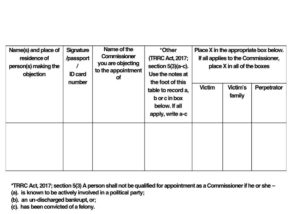
Is Mambury Njie the Right Individual as the Minister of Finance?
Dr. Ousman Gajigo
In a major development, President Barrow reshuffled his cabinet a little while ago. While there is a lot to be said about all the new and out-going ministers, I would like to focus on the Ministry of Finance. All ministries are important but this is arguably the most important one. It is particularly more so given the critical role of fiscal policy at this juncture in our economic development. For instance, the successful implementation of the National Development Plan (NDP), despite the importance of sector ministries, is also disproportionately under the Ministry of Finance.
This means that the individual appointed to head this ministry is absolutely important, as his decisions will have profound effects on our economic lives for years to come. The minister must be able to steer the government’s development program in a discipline and coordinated way. He must ensure that an effective team that is based on competency rather than tenure is in place. The NDP is after all just a mere document – any half-competent consultant can come up with one. What really matters is its implementation.
The effective implementation of the NDP would depend on whether the much-hyped pledges made by our development partners are actually disbursed. The disbursements of the pledges would ultimately depend on the implementation capacity at all ministries but more so at the Ministry of Finance. Without a capable minister, there will be no capable ministry. An incompetent minister in charge of a well-staffed ministry would be akin to throwing a wrench in an otherwise well-functioning machine.
It is sometimes challenging to assess the suitability of an individual for a post, especially when the individual’s public record is limited. In the case of Mambury Njie, this assessment is fortunately made easier since he is an individual with extensive public record, which can be compared with the requirements of the office he is recently appointed to.
Before going into Mambury’s track record, it is worth quickly looking at the point frequently raised by many individuals in his favor. This is the story that Mambury Njie advised Yahya Jammeh against the execution of 9 prisoners on death row in 2012. According to the story, Jammeh was so unhappy about this advice that he sacked Mambury. As everyone knows, the execution of those 9 individuals ended up taking place.
At first glance, this seems like a positive story. But on a closer examination, this story is more worrying than a being a mitigating factor for having faithfully served Jammeh in various cabinet positions. Bad as those executions were, they were not the only terrible deeds by Jammeh. Where was Mambury’s sage advice when the Jammeh regime executed 14 students? These students did not even have the benefit of being tried or convicted. Where was Mr. Njie’s counsel to Jammeh when the dictator was forcing scores of people to drink deadly contortions in his infamous hunt for witches? Where was Mr. Njie’s conscience when Jammeh was effectively sentencing people to their deaths by forcing them into bogus HIV treatments?
The story of Mambury advising Jammeh against executing the prisoners only looks positive when viewed in isolation. Assessed against the known realities of the Jammeh’s regime, it demonstrates not only a surprising level of naivety for someone who worked closely with a dictator for a long time but also a lack of judgement. An appropriate demonstration of judgement or fortitude would have been Mambury resigning in protest rather than being dismissed. One is left to wonder whether Mambury would have faithfully continued to serve Jammeh until the very end if he had been given the chance. The fact is that Mambury served at the highest levels of the Jammeh regime in multiple positions for a long time despite being aware (or should have been) of most of the important events that transpired. What this means is, by and large, Jammeh was satisfied with the role he tasked Mambury. In a nutshell, there is nothing positive about how Mambury served Jammeh or how his tenure ended. Jammeh sacked many close confidants after all. How and why those confidants were dismissed by the former dictator provides scant mitigating factor for their choice of abetting him.
At this point, some Mambury supporters would still claims that simply serving in government during under Jammeh should not be too damning. After all, many Gambians did. But there is an important distinction between high-level political appointments and other technical or bureaucratic posts. Serving in the cabinet is a choice that individuals make. Most cabinet positions are political appointments, while low and mid-level bureaucrats are civil servants whose positions are apolitical. Serving in cabinet requires a certain embrace and ownership of government policies and actions that does not extend to civil servants.
Delving deeper into actual track record, what can we say about Mambury accomplishments as a long-term cabinet member under Jammeh? Focusing on his role as a Minister of Finance, do we any information on actual accomplishments in pertinent areas such as public finance management, public expenditures, budget discipline, domestic resource mobilization or overall fiscal policy? Were there any substantive and enduring reforms he instituted during his cabinet and diplomatic posts? Judging by available record, financial mismanagement, excessive expenditures and pilfering our national treasury by Jammeh continued apace. As a result, we accumulated unsustainable levels of debts, the effects of which we continue to suffer even today.
What about Mambury’s track record since being appointed the Managing Director of The Gambia National Petroleum Company (GNPC)? A major, unresolved controversial case happened under his tenure there of less than 1 year. GNPC purchased a piece of land in Banjul for 17 million dalasi. There are 2 major problems with this purchase. One was whether that piece of land was properly valuated to deserve such a price. The second was whether Mambury followed proper procedures in finalizing the transaction before informing the Board of GNPC. For such a major transaction, proper financial analysis should have been done to ensure that the expected financial returns in the future justify the cost today. There is no evidence that this was done or shared with the board of GNPC at the time of the land purchase. I leave it to the reader to determine if this case demonstrates sound judgement or the ability to effectively manage a public institution.
To recap, Mambury took no particularly courageous stance during the Jammeh regime. His actual track record as a cabinet minister under Jammeh showed no accomplishments as far as I am aware. And a major scandal has marred his short tenure at the Managing Director of the GNPC.
So, given the importance of the Ministry of Finance, and the challenges we face, is Mambury Njie the best individual for this key ministerial post? Would Mambury Njie be a steward of sound economic management, including the re-allocation of budgets which will result in both winners and losers? Can Mambury be counted upon to make tough decisions and provide sound advice to the president even if it is politically unpopular? Would Mambury be able to oversee the staffing of key technical posts in the ministry with competent people?
The answers to these questions will have profound implications for our development for years to come. Most urgently, the NDP could easily go the way of the Programme for Accelerated Growth and Employment (PAGE), the failed predecessor of the NDP. As mentioned earlier, a lot of our development partners have made pledges to help us finance the NDP. But these are mere pledges, not commitments set in stone. For the pledges to materialize, sound economic management and prudent fiscal policy are absolutely necessary. It requires a ministry of finance that has competency at the very top.
In principle, there is nothing wrong with recycling ministers from previous governments. For one, they would come with some experience. And there were in fact some individuals who served at the top of the Jammeh regime that are not only competent but had actual accomplishments to their names. However, bringing back individuals for the simple reason that they have experience in specific ministries is worse than appointing inexperienced officials. Mere experience in the absence of demonstrated capacity or actual accomplishments should disqualify candidates. If development is the goal, individuals’ capacity and actual history of accomplishment should be the most important factor.
It is high time that the country appreciates the issue of capacity in a serious way. This means having the best individuals in important positions. This also requires having minimum standards of qualification. Comparisons such as whether this new minister is better than the previous one does not help matters when both ministers may not meet minimum standards. Without setting minimum criteria to be met, capacity issues will hobble our development challenges. And it must be emphasized that capacity is not the same as experience. While it is impossible to fill every position with highly qualified candidates given our poor country status, we can do much better than we are currently doing.
Brief Bio: Ousman Gajigo is a development economist by training. He has held positions with the African Development Bank, the UN, the World Bank and Columbia University. He holds a PhD from the University of Wisconsin – Madison, USA. He is currently an international consultant and also runs a farm in The Gambia.
The Job of Press Secretary really is About Plights & Pains
Alagi Yorro Jallow
Why would a lamb find himself in the wolf land of politics and politicking? The Washington Post of 30, May 2014 described being a presidential spokesman as “the ultimate burnout job”. The job of government journalist or press secretary really is about plights and pains. It is not a job for the meek. It is a permanent, constant contention with spins, contra-spins and anti-spins. It is a pain no one wants to suffer twice.
Ari Fleischer, US President George W. Bush’s first press secretary, captured the pains of the job very accurately: “The grueling part isn’t just the hours, which are bad, it’s that your mind never gets a rest. You’re always war gaming. It’s constant intellectual chess. You’re thinking of the next question that the press is going to ask, and that leads to the next question and the next question et cetera, et cetera.” Indeed, in US history, two press secretaries died on the job – both of heart attack, one right on his desk.
I do not know how many persons in government today wish to be exposed to the unfriendly, harsh realities of a media that does not take prisoners. When you work in government, all eyes, seen and unseen, are watching you. You must therefore choose what to say and what to write.
Defending any government anywhere is one of the most difficult jobs. You write and cancel words and write again. You query your every sentence and give answers to every unasked question before you push the information out.
It becomes particularly tricky and risky when the social media is the preferred channel. The social media is an agent of change. It is democracy bearing another name. That, ironically, makes it a forest of doves, lions, snakes and scorpions. The doves are very few and they do not stick out their fragile necks in defense of persons marked for online demolition. On the social media, warriors have no place in their heart to think of taking prisoners.
Experience in politics and government teaches better than the best teacher. For the journalist in government, every experience, no matter how unpleasant, enriches one’s appreciation of that thing called power and its demands. And it is not as if the system itself is appreciative of valiant efforts. It has a way of throwing the unwary to the dogs. It is the very home of treachery. But then, you become a better journalist only after going through the university of government appointment, especially if you are wise.
Speaking for a president or a politician can be very enabling. It empowers and makes the unknown renowned. You do not leave the job and need any introduction anywhere again. You are either popular or notorious or a miserable mix of both. A White House press secretary said it was the best job he ever had, “and the best job that the people who are there now will ever have. If you like politics and policy and the news media and how they interact, you’ll have the most impact you’ll ever have in your career. You get this incredible view of history being made. And when the leader of the free world turns to you in a meeting and asks you, ‘What do you think?’ that’s pretty exciting.” Around here in the Gambia, you share the limelight with the big boss to the envy of powerful people around him. That is why a press secretary is as blessed (and endangered) as the boss. You announce appointments, sign sack statements, spinning and gaslighting. Your name is a household item and on the lips of every kid who watches television and listens to radio. But the glitz ends right there. If you are the unwary, unlucky type, you soon get knifed by power and powerful interests. When Ronald Reagan was shot, his press secretary got hit with him. He barely lived to tell the story. When that happens, you walk down the dusty road lonely, alone.
Journalists working for State House rarely show their frustrations with their colleagues’ operations. But they are government people hired to “manage” the media and spin. So how do they do that when they are blinded for months? Does the perception in there suggest that these two gentlemen are just like the journalist out there who cannot be wholly trusted with information? No government anywhere likes the press. But the job of the press, really, is to make governments uncomfortable. It is when the press and the government fail to share the same bed that the people can safely say goodnight and sleep.
Otherwise, the morning could see the people asking where their freedom is. President Richard Nixon was one of the most unfortunate with the media among US presidents. He routinely blamed the woes of his government on a media which he accused of “distorted, even disloyal reporting.” From asking his media handlers to “build a mythology” around his person, a mismanaged, defeated Nixon had to say in exasperation:
“Our worst enemies seem to be the press.” He was too conceited to know that he was his own worst enemy. The media merely assisted him. The man ended up a classroom example of a president firmly held accountable by a determined media.
A spokesperson’s problem does not start and end with the questions his colleagues ask him. In the Gambia, that is just a little jab in the head. Your major headache could really be the boss and the company he keeps. If the boss is good, he could be unfortunate to have hawks as friends. The mouthpiece is a dignified night soil man who clears the mess before the day breaks.
When you do such for the system, fairness demands appreciation. But does it come at all? It depends on who the boss talks with. Manipulative friends around the boss kill the spokesperson’s spirit. These are men and women who know the media job more than anyone else. These ones pick holes regularly in the media engagements of their friend. They feed him regularly with what his press secretary did not do and what he over-did. It takes the lion hearted to keep going when these know-all behemoths bring their dirt. Now, how much of this has been lot? Joe Lockhart, another White House spokesman, once said that he knew he was doing his job well when everyone was mad at him.
“You walk into the briefing room and the reporters yell at you because you haven’t given them enough. And you walk into the next room and (government officials) are screaming at you for telling the press too much. That’s when you know you’ve hit the sweet spot.” Not everyone feels so. Many would wonder why take this thankless job in the first place.
Greater people in history experienced it. It made them better and immortal. Abraham Lincoln gave democracy its modern definition. He never had it easy with the media and media manipulators, the “dominant coalition.” But he didn’t shut himself in. On one occasion, he said after reading a series of attacks in some newspapers he asked himself:
“Abraham Lincoln, are you a man or a dog?” It was that bad, but his noble spirit took over and elevated him to a better leader.
Foreign Minister Tangara receives congratulations from EU Ambassador Lajos
The Honourable Minister of Foreign Affairs, International Cooperation and Gambians Abroad of the Republic of The Gambia, Dr Mamadou Tangara, Friday August 17th, 2018 received the Ambassador of the European Union Delegation to The Gambia, His Excellency, Attila Lajos at his office in Banjul.
The EU top Diplomat paid a courtesy call on Dr Tangara to congratulate him on his appointment as Minister of Foreign Affairs, International Cooperation and Gambians Abroad. Minister Tangara welcomed Ambassador Lajos and assured him of his resolve and commitment to deepen ties of cooperation between The Gambia and the European Union.
For his part, the EU Ambassador said the EU would continue supporting The Gambia’s democratic transition process and the attainment of the objectives of the National Development Plan (NDP) and realisation of the pledge made at the Donor Conference in Brussels on May 22nd 2018. He also assured EU’s support to the promotion and protection of democracy and the rule of law in The Gambia.
Issued by: Communication Unit of the Ministry of Foreign Affairs, International Cooperation and Gambians Abroad




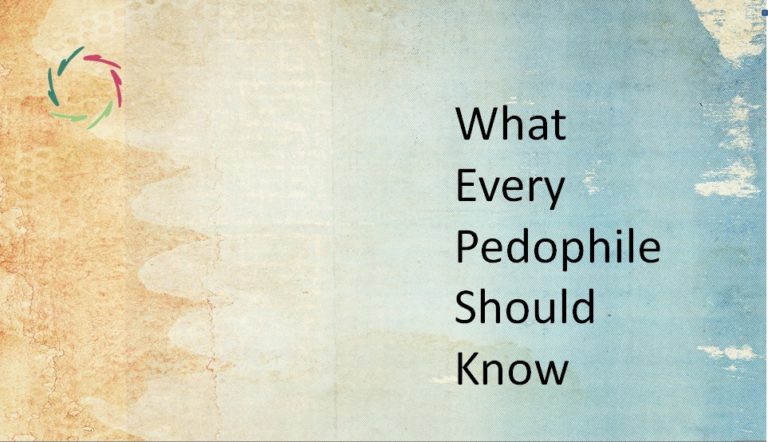

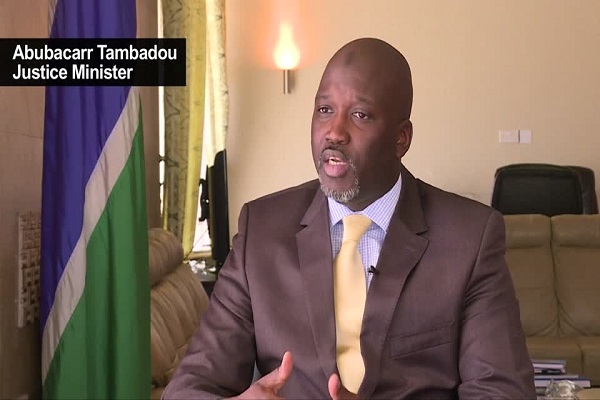
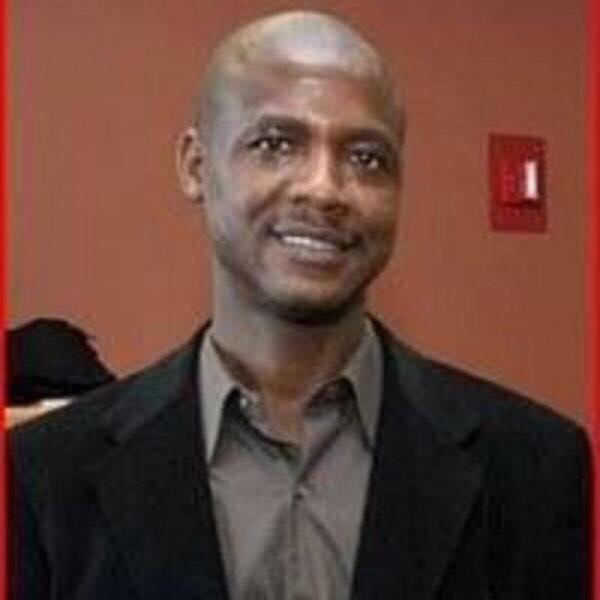
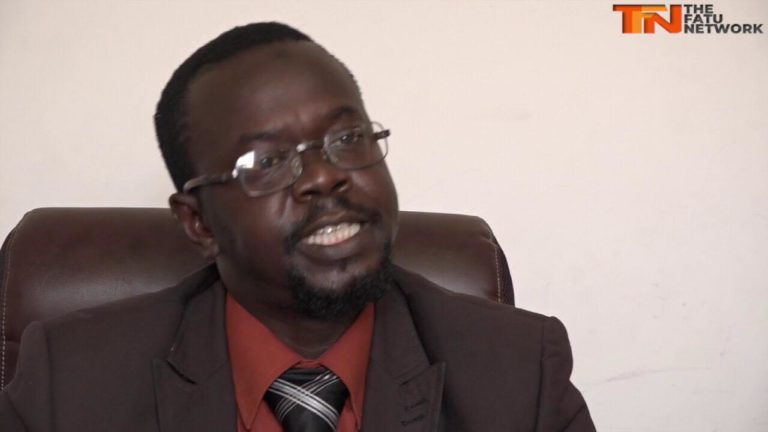
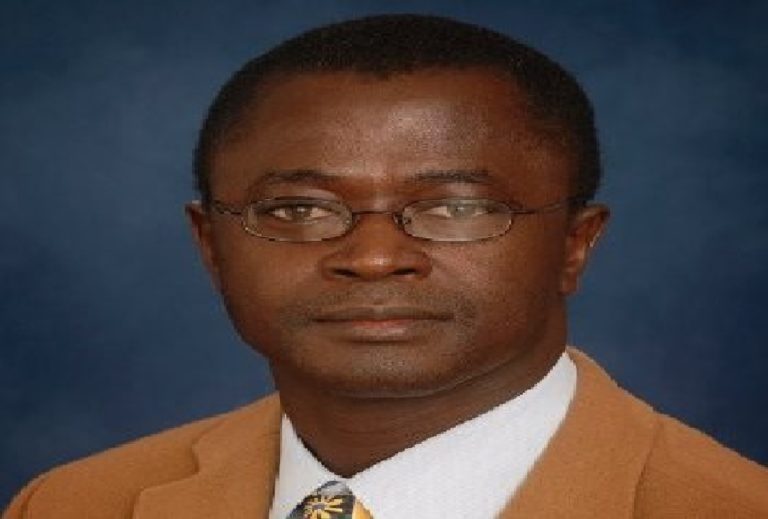
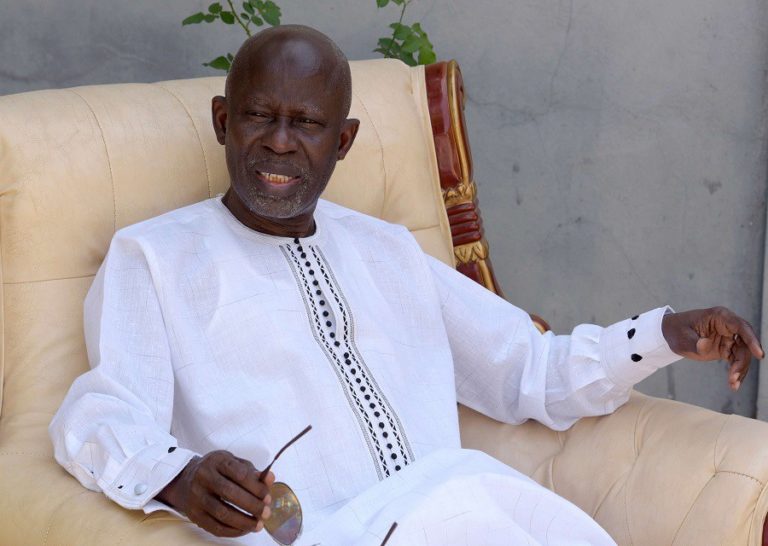
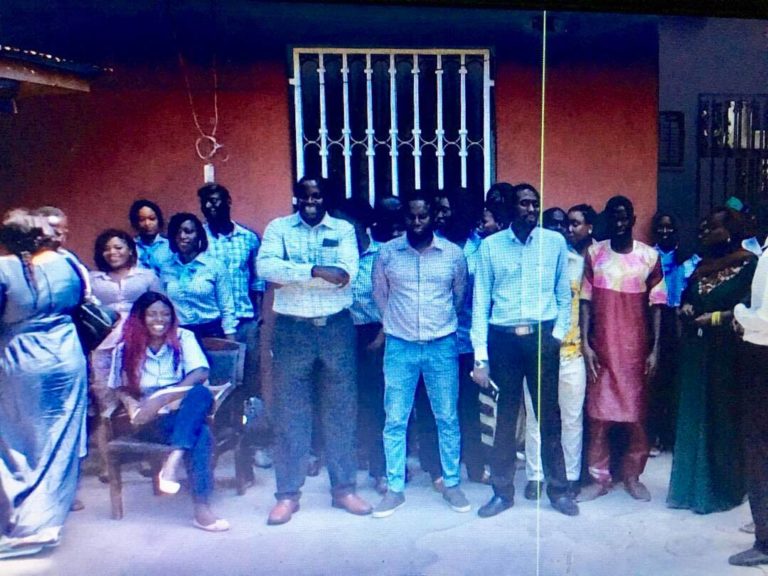
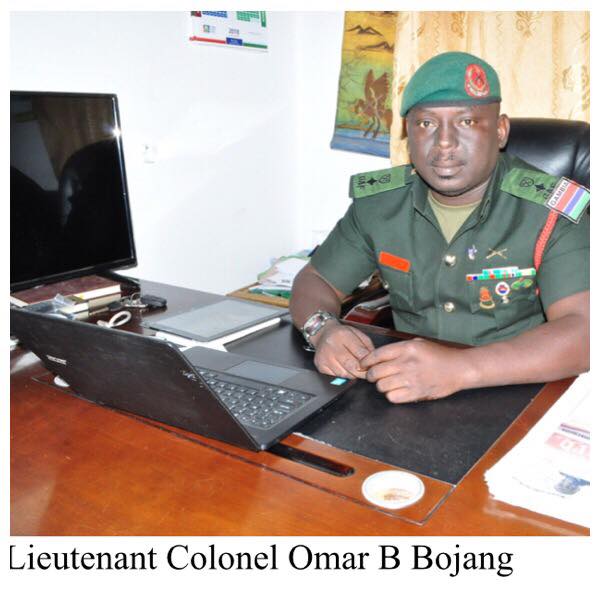
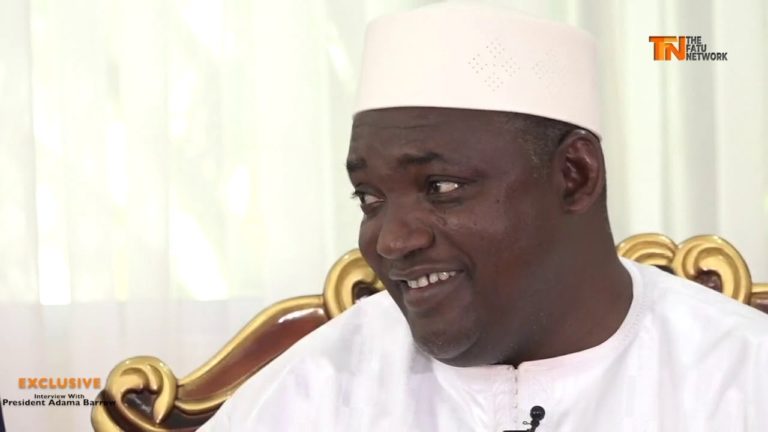
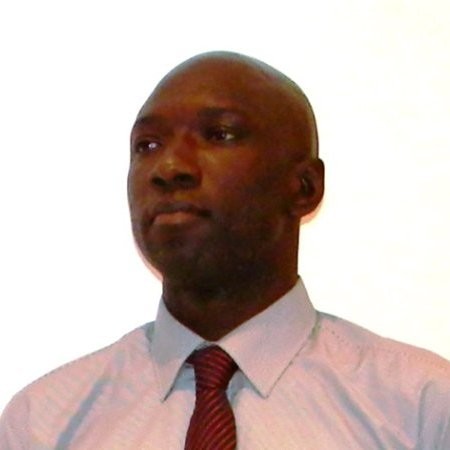
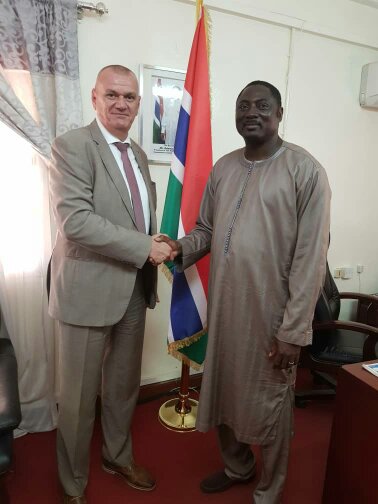
Source Of The Money Deposited Into The Fatou Bah Barrow Foundation
Following leaked transactions of a deposit of $752, 594.42 into the accounts of The Fatoumata Bah Barrow Foundation by TBEA Co., Ltd, a Chinese manufacturer of power transformers and a developer of transmission projects, Gambians both at home and abroad are demanding for investigations into the matter.
The transaction was made on December 18, 2017, into the Guaranty Trust bank account (GT Bank) of The First Lady Fatoumata Bah Barrow Foundation. On the same day The foundation made a bank transfer of $746,211.13 to White Airways, a Portuguese charter airline headquartered in Porto Salvo, Oeiras. The purpose of the transfer according to the telex report was to hire a flight to China where the money originated from.
Whether that was the flight that took President Barrow and his delegation to China on Tuesday, December 19, 2017 a day after the transfer was made to White Airways is the question on the lips of many.
It could be recalled that President Barrow visited China on December 19-26 2017 as special guest of Chinese President, Xi Jinping.
When contacted to shed light on the issue, the acting CEO of The Fatoumata Bah Barrow Foundation, Fatou Ceesay told The Fatu Network that the issue is being investigated at board level.
‘Well, first we do not know how the money was transferred into our accounts but we are investigating the matter at board level’. Fatou Ceesay told The Fatu Network.
An observer wondered how such a thing could happen. ‘
‘First they don’t know how the money got into their account then why did they make the $742,211.13 transfer?” He asked.
Through our investigations, The Fatu Network gathered that The Gambia Government through the Ministry of Energy and The National Water & Electricity Comapany (NAWEC) are on the verge of giving the transmission and distribution project of the country to TBEA Company Ltd, the company that put $752,594.42 into the bank account of The First Lady’s Foundation.
‘We are at the final stages of scrutinizing the project proposal sent to us by TBEA, Company LTD to make sure everything is fine before they are awarded the contract’. An official at the ministry of Energy told The Fatu Network. The official added that once awarded the contract, TBEA will work on the transmission and distribution networks for Soma to Basse and the north bank region including Laminkoto and the Diabugu area.
The project is funded by the world bank, the European Union and The Chinese Government.
The Ministry of Energy received proposals from TBEA and Power China but the latter is said to be more specialized in power generation meaning the contract is likely to go to TBEA Company Ltd.
An internet search led us to an article by Eurasianet in Kyrgyzstan where the same company, TBEA, previously known as Tebian Electric Apparatus was contracted to build the Datka-Kemin high-voltage power line, which joined power grids in the north and south of Kyrgyzstan in 2015. According to the article, out of seven legislators, only one was apposed to the deal in 2013. He was quoted as saying that the rest of the legislators were bribed.
“This was a scam from the get-go. This company worked the MPs, brought them over to China. Our MPs went there, toured Hong Kong, stayed in five-star hotels, received presents,” Abdyrakhmanov said. “Anywhere else in the world you would call this bribery.
https://eurasianet.org/s/kyrgyzstan-power-plant-blame-game-threatens-political-showdown
Reacting to the story, Banka Manneh, a Gambian based in The US said:
‘This report about the Fatou Bah Barrow Foundation is part of a pattern of abuse of power currently underway in The Gambia, and this is a very disturbing development. President Barrow must act swiftly to reign in his friends and associates both in and outside government – we cannot afford these daily barrage of bad news regarding misbehaviors, that are to a large extent criminal, by these elements. But then again, who knows – maybe he is privy to all of them.”
Meanwhile, Gambians are eargerly waiting for the foundation to complete its investigations so as to answer the questions on the minds of many.